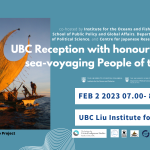 Community Luncheon
Community Luncheon
This will be a chance to engage with one another in an informal and relaxed setting and to create an opportunity for deepening our departmental community.
 How Ancestral Voyaging Mobilizes Knowledge of Biodiversity & Climate Change
How Ancestral Voyaging Mobilizes Knowledge of Biodiversity & Climate Change
The future of the ocean is essential to the planet’s future and human life. Climate change intersects profoundly with biodiversity, food security for billions of humans, culture, and economy and peace. The sea-voyaging people of the Pacific have developed intimate and profound knowledge of the Ocean over millennia. The extreme biodiversity of the western Pacific makes its health key to revival of planetary biodiversity.
 “Who Owns Outer Space? International Law, Astrophysics, and the Sustainable Development of Space” Dr. Michael Byers
“Who Owns Outer Space? International Law, Astrophysics, and the Sustainable Development of Space” Dr. Michael Byers
Dr. Michael Byers and Dr. Aaron Boley host a talk on their upcoming book, “Who Owns Outer Space?International Law, Astrophysics, and the Sustainable Development of Space” at the Vancouver Institute at UBC.
 UAlberta SDG Discussion Panel: Climate change policy in a time of crisis, war, and rapidly evolving technology
UAlberta SDG Discussion Panel: Climate change policy in a time of crisis, war, and rapidly evolving technology
Every week, evidence of looming catastrophic climate change seems to become stronger, including the 2021 heat dome deaths and mass flooding in British Columbia that underscored Canada’s vulnerability. For policy-makers, though, the task ahead of them is not getting any easier as they seek to navigate a changing global context. In this talk, hear from two experts in the economics and politics of climate change on what we know, what we’re learning, what we need to do, and the largest domestic and international challenges ahead.
 “Unsetting the Structure: The Russia-Ukraine War” Dr. Ibrahim Muradov
“Unsetting the Structure: The Russia-Ukraine War” Dr. Ibrahim Muradov
UBC Postdoctoral Fellow Dr. Ibrahim Muradov unpacks the driving force behind the war in Ukraine at this lecture hosted by the Centre for European Studies.
 Outdoor Graduate Student, Faculty and Staff Social
Outdoor Graduate Student, Faculty and Staff Social
This will be a chance to engage with one another in an informal and relaxed setting and to create an opportunity for deepening our departmental community.
 Career Design Journeys – A Workshop and Panel Discussion with UBC Political Science Alumni
Career Design Journeys – A Workshop and Panel Discussion with UBC Political Science Alumni
Join UBC Political Science Alumni and our UBC Arts Career Strategist for an evening of reflection and discussion about the process of creating your post-graduation plan.
 EVENT POSTPONED: “The Modern Politics of International Criminal Law” – Prof. James Stewart
EVENT POSTPONED: “The Modern Politics of International Criminal Law” – Prof. James Stewart
Our International Relations Colloquium hosts Professor James Stewart (Allard) for a lecture titled, “The Modern Politics of International Criminal Law.”
 United Nations EMRIP Seminar
United Nations EMRIP Seminar
Pursuant to Human Rights Council resolution 33/25, during its fifteenth session in 2022, the UN Expert Mechanism on the Rights of Indigenous Peoples (EMRIP) confirmed its decision to prepare a report on “Establishing monitoring mechanisms at the national and regional level for implementation of the UN Declaration on the Rights of Indigenous Peoples.” This report will address efforts to implement the Declaration and monitoring mechanisms at the national and regional levels. This Expert Seminar is part of a larger request for contributions from Indigenous Peoples, States, National Human Rights Institutions, academics and other independent experts.
 French-German Relations: an Anchor of Stability in Times of Fragmentation and Uncertainty? 60th anniversary of the Elysée-Treaty
French-German Relations: an Anchor of Stability in Times of Fragmentation and Uncertainty? 60th anniversary of the Elysée-Treaty
The Élysée Treaty, signed by President Charles de Gaulle and Chancellor Konrad Adenauer on 22 January 1963 at the Elysée Palace in Paris, marked a watershed in European history. The conference will evaluate the relevance of the Treaty in times of political-economic turbulences and war.